Doctors’ Notes
BackLife With Boys
We all have certain expectations or assumptions heading into parenthood, even if we never voice them. Growing up with sisters (and no brothers), I assumed parenting would involve tea parties, braiding hair, and shoving little plastic arms and legs into tiny clothes.
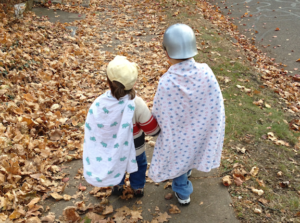
Before I had children, my visions of the future didn’t really include weapons made out of LEGOs, blankie-capes, and tiny plastic soldiers lined up on the windowsill “guarding” the house. But then I had a boy. And another. And another. And another. And then there were four lively, amazing creatures making a whole lot of noise and seemingly always obsessed with battle plans, swords, and superhero antics.
Is this ok? What’s with all this violence? Why are they so LOUD? And what’s the fascination with sticks?
I admit it’s taken me some time to adjust to the wonderful world of boys. Before kids, if I saw a pack of boys being loud and active, I would assume their parents just didn’t have control over them. (Yes. It’s true. Remember everything we “knew” about parenting before we had kids? I’m laughing just writing this!) Now I’m the one getting looks when my tribe enters the playground. I can see the other parents’ faces when my kids run full speed through a park, chasing each other, putting each other in “prison,” and splitting up into teams to play battle. Yes, I allow all of that — while making sure they’re not mowing down toddlers and falling on sticks.
I’ve wondered at times if all this talk of war and battle, this whole good-guy/bad-guy thing, is ok for them. I never played war growing up. I never felt the need to jump from couch to chair to ottoman chasing after a sibling. Will they grow up thinking violence is ok? And what’s with the guns? We have no actual toy guns in our home, yet everything from graham crackers to Duplo blocks have been fashioned into all sorts of weaponry.
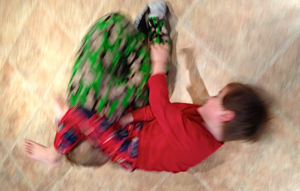
As I’ve been reading up on raising boys, it turns out that the superhero “violent” kind of play is actually good for them. One article actually recommended we parents reframe it in our minds and call it “heroic” play — because that helps us stomach it, and because it’s not actually violent or intending to do damage. Through it, kids play out their desire for good to conquer evil. They get to play-act being invincible, and it really is an amazing use of their creative imaginations. So-called “violent play” does NOT lead to violent behavior later on. In fact, the opposite may be true: play deprivation has been linked to deviant behavior in adulthood. When children play act violence, it’s not about really killing someone. It’s about the child rescuing someone, conquering evil, and overcoming obstacles. And it’s pretty universal. How many of us actually needed to teach our sons how to use a toy sword or gun? It really is how they’re wired.
Now, this kind of play can definitely cross the line to aggression and inappropriate activity. So it’s important as a parent to provide some monitoring, especially on behalf of younger children, and to set boundaries to avoid injury and bullying. Here are some guidelines that might be helpful:
• Don’t let children force another child into being the “bad guy.” Have them agree on who is the bad guy, or encourage them to team up against an imaginary one.
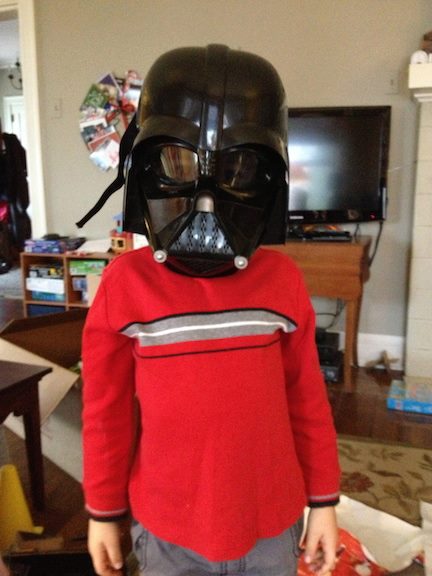
• Remember that loud doesn’t necessarily mean bad. (I’ve really had to work on this one!) Play that is loud but not aggressive includes yelling, falling down, pretending to hit/sword fight/etc. Aggression results in kids being hurt, and not just physically. Don’t allow humiliation, bullying, threatening, or real hitting. Help the kids to see the difference and to honor those boundaries. If you’re seeing repeated patterns of aggression from a child, consider seeking help, which might include calling us at Kids Plus to discuss it.
• If a child is showing real anger or fear or stops having fun, it’s probably time to step in and encourage a discussion about where things went wrong. Playing is supposed to be fun, and if it’s not, kids lose all the benefits of it.
• If play seems to be dominated by pretending to kill or harm others, suggest rescue operations or other adventure play as alternatives. With older children, have conversations about war and enemies. It might be helpful to remind children that most people in the world are “good guys,” and that “bad guys” make up a small percentage of the population.
• Let them play! It can certainly be a balancing act — letting them go vs. intervening. Kids today grow up with so much more parental intervention than in the past, and it might not all be for the best. Within reason, let your boys be daring and take appropriate risks (even if it sometimes makes your heart jump). Let them hold the creepy bugs and end up covered with mud and jump off high things. In other words: let them be boys.
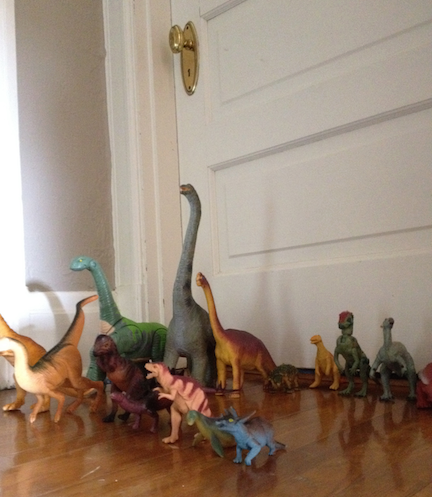 • Balance the rough and tough activity with conversations about emotions, something many experts say is an important aspect many boys are lacking (the conversation, not the emotions!).
• Balance the rough and tough activity with conversations about emotions, something many experts say is an important aspect many boys are lacking (the conversation, not the emotions!).
• Listen to them. Draw them out about the intricacies of their battle plans, and about how the characters are interacting. Frankly, I have very little interest in the details of “war.” But it means a whole lot to my kids when I take the time to listen and spend time with what they’re interested in.
Now eight years into my parenting life with boys, I catch myself taking photos of those toy dinosaurs lined up and standing guard outside my bedroom door, often right before I trip over them. I’ve been known to go along with being vanquished by a brave knight (doesn’t that sound better than “being stabbed with a plastic sword”?), and I’ve filled in as the army medic in living room battles. I can differentiate between a skid steer and a front loader, and I’ve caught myself saying, “Oh look, there’s a train!” even when I’m the only one in the car.
I stop myself, most days, before reprimanding my rambunctious boys for simply being loud and active. And I’ll admit that one of my favorite Things I Never Thought I’d Hear Myself Say has been, “Put the gun away, we’re going into church!”
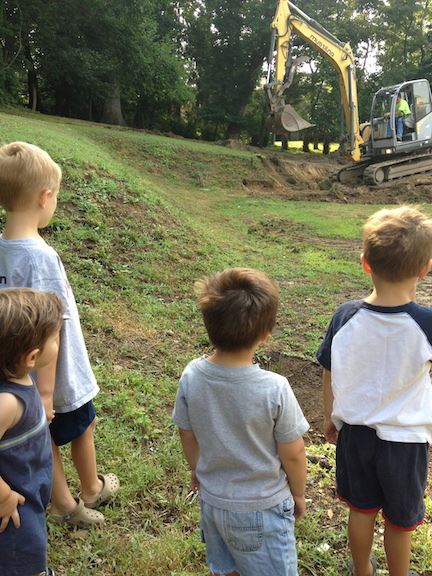
We do set boundaries — no “guns” at the table, for instance — because, after all, we needsome standards! We also try to keep a balance, making sure the boys are involved with household chores, helping each other, and being exposed to lots of music and stories.
Raising boys (and all children) is exhilarating and challenging. If you are a parent of a boy, embrace the noise and the energy and let him teach you things you never knew. (Did you know the box jellyfish is one of the world’s most poisonous creatures?) Even — and maybe especially — if it doesn’t come naturally to you, embrace their world of superheroes, sticks, bugs and construction trucks.
And don’t forget to savor the snuggles of little boys; there isn’t much that’s sweeter in life.
For more reading on the life of boys, consider Raising Cain: Protecting the Emotional Life of Boys by Dan Kindlon and Michael Thompson, Speaking of Boys: Answers to the Most Asked Questions About Raising Sons by Michael Thompson and Wild Things: The Art of Nurturing Boys by Steven James and David Thomas.
Dr. Amy Maddalena, a Kids Plus Doc since 2006, teaches the Expectant Parent Orientation at our Pleasant Hills office.